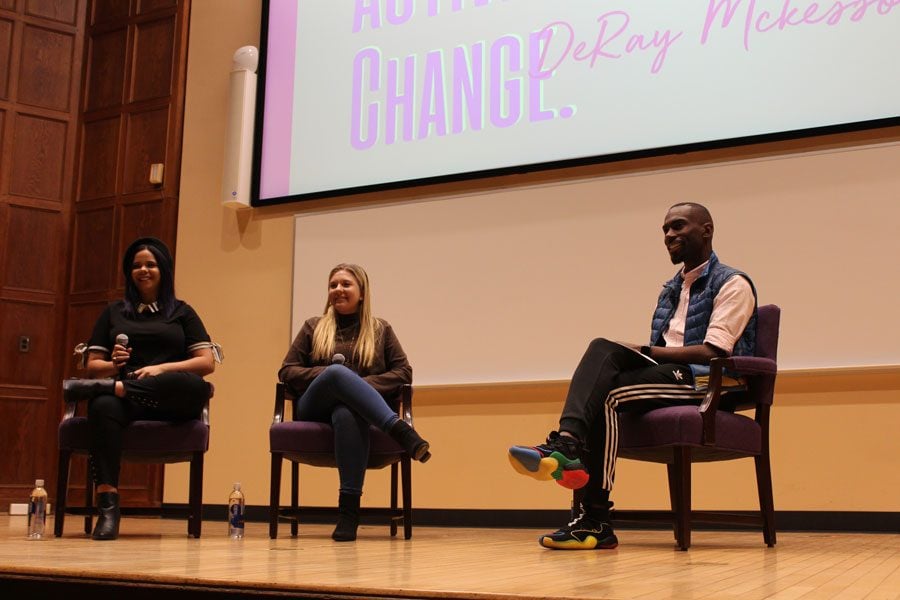Survivors of Parkland shooting say gun activism has ‘awoke a generation’
Zoe Malin/The Daily Northwestern
Marjory Stoneman Douglas High School students Samantha Fuentes and Jaclyn Corin shared stories about advocating for gun violence prevention since the mass shooting in Parkland, Florida with fellow activist DeRay McKesson.
December 10, 2018
March For Our Lives activist Samantha Fuentes does not look injured — she wears boots with heels and makeup like other women her age, and speaks sarcastically with a sense of humor.
But Fuentes, a former student at Marjory Stoneman Douglas High School in Parkland, Fla., was injured in the February shooting at the school that killed 17. She was shot in her thigh, and shrapnel from the gunman’s rifle pierced her legs and face. She now lives with post-traumatic stress disorder.
“I’m struggling with talking up here right now because I’m thinking about someone rushing through the doors to kill me,” Fuentes said at an event hosted by College Democrats in Lutkin Hall on Saturday.
In a conversation moderated by Black Lives Matter activist and Pod Save the People host DeRay Mckesson, Fuentes and her former classmate Jaclyn Corin discussed the activism they feel has “awoke a generation” in front of a crowd of around 200 students and Evanston community members.
Since that day in February, Fuentes and Corin have been some of the driving forces behind the March for Our Lives movement. The day after the shooting, Corin connected with Florida State Senator Lauren Book — together, they organized over 70 meetings in the Florida State Legislature in five days. Corin said she and her peers made a statement to the world that “we were not going to let the news cover our story like it covered Columbine 20 years ago, or Sandy Hook six years ago.”
Fuentes, by contrast, did not always want to be an activist. After she recovered from the injuries she sustained in the shooting, however, Fuentes raised her voice, because she “never wants anyone to experience the pain, grief and sorrow” she has.
The students also discussed some common misconceptions of the March For Our Lives. Corin said that in the early days of the movement, rhetoric about gun control and gun bans circulated in the media. But that was never March for Our Lives’ intention, Corin said. The movement’s aim has always been gun violence prevention.
Some conspiracists stated that the students were crisis actors — Fuentes said some suspected her black eye caused by shrapnel lodged in her face was makeup. Corin noted that people often have a conception that the movement is just “for white people.” This is a stigma the organization has worked to dispel by connecting with communities affected by gun violence across the United States.
“The story of Parkland doesn’t encapsulate the full story of our country,” Fuentes said.
Northwestern College Democrats Co-President Claire Bugos said the group has been adamant about getting Parkland students to come speak for a while — she was impressed by Fuentes’ and Corin’s charisma and was grateful they shared their messages.
“We did not just bring a speaker to NU,” Bugos said. “We supported student activism.”
Between dialogue about the need for universal background checks and preventative health care, Fuentes touched upon a topic she feels is not adequately discussed: victim advocacy.
When families and communities experience tragedies like mass shootings, Fuentes said, they often do not receive monetary compensation and mental or physical rehabilitation resources. She added that not all states have victim funds, a way for the public to directly donate money to the victims of mass casualty crimes.
“I got shot. I survived. But I didn’t necessarily get the most help,” Fuentes said. “Shootings are a headline to headline basis and the victims are often forgotten.”
During the Q&A portion of the event, when an audience member asked if the answer to solving gun violence is revolution or reform, Mckesson jumped in by saying he thinks the two work in concert with one another.
“We need to think about reform in terms of making changes that will affect real people today, while also looking towards wholesale changing a system that failed in the first place,” Mckesson said.
Among those in the audience were members from People for a Safer Society, a gun violence prevention organization founded in 2013 in Skokie, Ill. Founder Denyse Stoneback thought it was brave for the Parkland students to go to the Florida state capitol after leaving the funerals of their peers.
“For them to be so young and have so much insight into this issue is inspiring,” Stoneback said.
Corin emphasized the importance of engaging and caring about gun violence, even for people whose lives haven’t been directly affected. She added that she and Fuentes hope people across the country will learn from their experiences and do their best to enact change.
“Even if you haven’t experienced gun violence, make people understand this issue,” Corin said. “Be an activist because you don’t have to.”
Email: [email protected]
Twitter: @zoermalin


